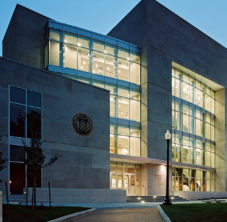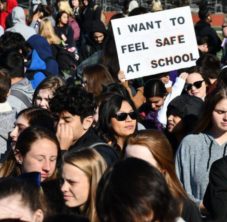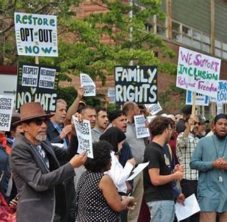I had an enriching discussion with a principal at one of the county’s public schools.
“What do you think about school choice or school vouchers? There are parents who see in their child the next Einstein, and others who see in them the next Andrew Lloyd Weber. In either case they prefer a school offering a matching curriculum.”
(The bifurcation doesn’t have to be by aptitude. There are parents who are conservative in their outlook, and want to send their children to a like-minded school. Conversely, there are parents who are liberal, and would like a matching school environment. There are lots of ways to characterize a parent’s aspiration!)
He replied that one purpose of a public school is to actually expose students to a variety of outlooks and a variety of demographics. If a child is born unto two parents who are NASA Goddard geeks, goes to school for 12 years with other children of NASA Goddard geeks, and during recess those children are continuously debating the merits of Pluto’s cruel and merciless demotion from planet to rock, then there is a chance that the child will be missing something from an otherwise diverse school experience.
There are other prefabricated justifications for public schools, of course: ensuring a standard curriculum, ensuring access for under-served students, etc. Regardless, from the way I formulated my question, such was the principal’s response—and there are three things wrong with that response.
First, there is no indication that students who attend monolithic private schools, or who are home schooled, are any less capable to properly socialize with “different” types of people. CM Kristin Mink proudly states that she attended MCPS, and she hasn’t come across as someone who is particularly tolerant or able to think critically. Two violent incidents at BCC High School, while thankfully rare, also prove that public school doesn’t guarantee safe and tolerant spaces.
Second, setting a policy that encourages a particular behavior requires parental buy-in. A few core subjects (literacy, arithmetic, critical thinking, American history) are indeed mandatory in any school. Anything else, from LGBT to New England etiquette to Olde English Gender Studies, require ratification by the students and their parents to make them mandatory. Nobody in MCPS has made that effort, and the policy makers rely only on coercion.
Lastly, our school system is headed in the direction of the one in Los Angeles and Chicago. The corruption, predation, nepotism, racism, and academic decline that we’ve seen in the last 14 months effectively mean that MCPS and the teachers’ union have lost, for the time being, any moral authority to dictate what is “good” for students, parents, or teachers.
I’m left with the conclusion that school choice and school vouchers are the best avenues to give our students the opportunities they deserve—including interactions with “different” types of people.




